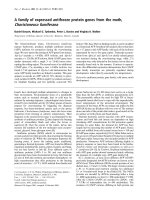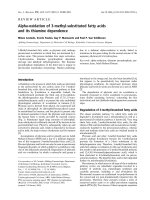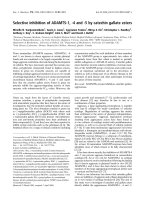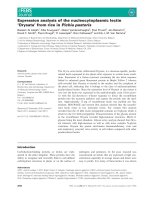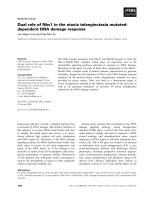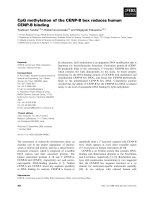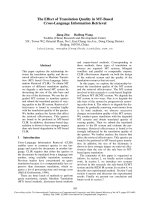Báo cáo " Adventurous tourism-a potetial realm of world Natural Heritage - National Park Phong Nha - Ke Bang " ppt
Bạn đang xem bản rút gọn của tài liệu. Xem và tải ngay bản đầy đủ của tài liệu tại đây (426.76 KB, 12 trang )
VNU Journal of Science, Earth Sciences 27 (2011) 77-88
77
Adventurous tourism-a potetial realm of world Natural
Heritage - National Park Phong Nha - Ke Bang
Tran Nghi*, Ta Hoa Phuong, Vu Van Phai, Dinh Xuan Thanh,
Nguyen Thanh Lan, Nguyen Dinh Thai, Nguyen Thi Hong
Faculty of Geology, Hanoi University of Science, VNU, 334 Nguyen Trai, Hanoi, Vietnam
Received 27 April 2011; received in revised form 5 May 2011
Abstract. World Heritage National Park Phong Nha - Ke Bang has been and is being invested by
the government in general and by Quang Binh province in particular to expand into a population
with different types of tourism in order to invite domestic and foreign tourists. Since the 60s of
20th century, the Phong Nha - Ke Bang zone has been regarded as a tourism spot that attracts the
most number of tourists among the tourism industry of Quang Binh province. However, since then
this National Park has only exploited the exterior caves and has not, together with other types of
tourism, extended its activities in all national Forest’s territory. Therefore, in this article the
authors’s group will begin to explain in details of other potential adventurous tour types of Phong
Nha - Ke Bang region in particular and of Quang Binh province in general, these are: to explore
the caves in adventurous tours upon limestone mountains with perpendicular cliffs by road 20,
cable - riding tours through National Park zone where the cables are put on the highest mountain
peaks, adventurous eco-tours inside proteozoic forests famous for a most diversified and abundant
ecosystem in South East Asia. These are the potential and valuable types of tour assuring a great
charm for a huge number of tourists inside and outside the country.
1. Introduction
∗
As for Quang Binh, people have for many
years referred to it as “Laotian wind, white
sand”, as a barren land struck by poverty. Few
people talk of the advantages that nature has
given to it. That land is potentially rich
regarding tourism, possessing beautiful beaches
such as Da Nhay which is located at the foot of
Ly Hoa mountain pass and decorated with
tortuous seashores and billowing stone tops, or
_______
∗
Corresponding author. Tel.: 84-4-38542489.
E-mail:
for example in Dong Hoi, where the gold dust
plain expands kilometers long by Nhat Le
estuary, and the historical Gianh river - the river
used to be, for hundreds of years, a boundary
line to separate North and South Vietnam. The
poetic scenery of this water region will
accompany the tourists all the way up to river
Son, onto the renowned Phong Nha cave,
through Toi cave and onto Chay river,
threading one’s way through limestone
mountain of the Ke Bang block.
This is a limestone region rated as most
grandiose in the world, with diversified and rich
T. Nghi et al. / VNU Journal of Science, Earth Sciences 27 (2011) 77-88
78
flora and fauna, and also spectacular caves. Due
to the diversified value of a yin-yang terrian,
and the interference between the stone and soil
mountains, and an interlacing hydrology system
together with a vegetational cover, Phong Nha -
Ke Bang gives itself the potentials to develop
various forms of tourism, satisfying increasing
demand of inbound and outbound tourists.
Among those forms, adventurous tourism in
Phong Nha - Ke Bang should be taken in mind,
invested and exploited. Through research on the
terrains, geomorphology and geology of the
heritage zone, we have found out that the
following adventurous tour patterns and
specific characteristics are suitable for the
heritage zone: cave exploring, adventure
journeys in addition to eco-tours, mountain
climbing and cable-riding tours.
2. Cave exploring
In this article we won't have a great
ambition to introduce the grandeur of the cave
system of Phong Nha which is more than 80km
long, which had been jointly researched by the
officers from the Faculty of Geography and
Geology of the Synthetic University and the
explorers' delegation from the English Royal
Cave Association at the end ofthe last century.
The results mentioned have been widely
introduced to the press inside and outside the
country especially the series by Howard
Limbert about the cave Heavens of Phong Nha -
Ke Bang published on “Inter. Caver" magazine
since 1992, which have many colorful pictures.
For the time being only 2 caves belonging
to the Phong Nha - Ke Bang cave system have
been brought into exploitation for the sake of
tourism, these are Phong Nha cave and Kho
cave. Phong Nha cave is a water cave
discovered long ago. Tourists riding on motor-
boats are permitted to penetrate the cave up to
600m inside, along a way filled with stalactites
of various shapes. Some stalactites droop down
like the hair of a fairy, some stalactites
elsewhere gather together like an ethereal
palace, some stalactites in other places are
arranged like a "boudoir” full of tender silk and
satin made from stones. Also many other
stalactites while being hit will make sounds like
musical instruments, or will shine sparklingly
through millions of tiny calcium crystals. From
time unmemorable Phong Nha has been well-
known as a natural wonder.
T. Nghi et al. / VNU Journal of Science, Earth Sciences 27 (2011) 77-88
79
Fig. 1. Phong Nha – Ke Bang cave system.
T. Nghi et al. / VNU Journal of Science, Earth Sciences 27 (2011) 77-88
80
Departing from Phong Nha, climbing the
high steps made from stones, tourists can see
cave Kho which has been exploited recently.
On the road, if the tourists pay much attention,
they can watch the small coral populations aged
more than 300 million years clearly marked
inside limestone layers. Cave Kho belongs to an
ancient cave generation which is older than that
of Phong Nha, which is perched up high
halfway mountains. Inside the cave, tourists
will see many inclined, tottering or even
collapsed stalactites on the ground of the cave.
That was the indispensable consequence of the
elevation process of the earth's crust. However,
there are still innumerous intact stalactites of
various shapes, forming spectacular figures.
Nevertheless, by choosing this tour route,
tourists in fact are just granted to visit the
outside of the spot. In order to examine the
wonders of the longest water-cave path of the
world tourists must be equipped with plastic
boats, safety clothing, strong illuminating
devices, and of course enough nourishing food,
and essential medicine. Usually, those who are
eager to explore the caves are the brave ones.
who have the ability to cope with any situation,
and must swim well of course. Although they
have just entered an inner site of cave Phong
Nha - the world of “eternal” darkness, there are
so many intriguing things waiting for them.
Because, like almost other long karst caves, the
caves found in Phong Nha - Ke Bang block are
always zigzag, ramified, successively filled
with many water and dry caves (Fig. 2).
Fig. 2. An underground water flowing between cliffs inside Phong Nha cave (Photo by H.Limbert) [1].
T. Nghi et al. / VNU Journal of Science, Earth Sciences 27 (2011) 77-88
81
Fig. 3. A very shallow river whose bottom deposits are pebble stones found inside cave Khe Ry
( Photo by H.Limbert) [1].
Apart from Phong Nha cave mentioned,
there are also systems of Vom (Fig. 4), Khe Ry
(Fig. 3) and Me Cung caves found inside the
Phong Nha-Ke Bang cave system, which is
suitable for us to open cave-exploring tours.
The systems of Vom cave and Khe Ry cave are
also big in size. The river Ruc Ca Rong, which
is 30km long in total, with its narrow and deep
valleys sometimes flows over land, other times
hides itself inside the beautiful caves of the
Vom cave system. Me Cung cave in particular
has such a complex ramification as a labyrinth,
which will surely bring surprises to the brave
explorers.
Fig. 4. Several calcium accumulation types inside a room of cave Vom ( Photo by H.Limbert) [1].
T. Nghi et al. / VNU Journal of Science, Earth Sciences 27 (2011) 77-88
82
3. Adventurous journeys
It can be said that Phong Nha - Ke Bang is
an idealistic place to expand adventurous tours.
If we watch only the outside areas of the
mountain block, few people can think that
Phong Nha - Ke Bang is regconized to be the
biggest limestone desert of the world [2]. While
the outer mountains of the Phong Nha - Ke
Bang block are occupied with vast and
verdantly green forest, the inner mountains are
mostly “bold" limestone mountains, almost
without any vegetational cover. Inside the dry
caves are vestiges of broken baked clays, giving
evidence that men once sojourned here. And
right within the center of the "desert” there are
oasis with cool water, trees, and birds. The
strange sceneries will let the tourists be amazed
with various surprises.
Phong Nha - Ke Bang is a place of a high
level of biological diversity. If we enter the Ke
Bang block by water, upstream river Son and
turn to river Chay, the charming scenery a
magnificient area will come in sight of the
tourists. At the gate of Hang cave, a huge stone
upon which many coral stalactites lay will
appear like white beautiful flowers on the black
limestone ground. Those corals tell us of a time
long ago, when the lime mud layers were at a
standstill at the sea bottom, when these corals
lived in populations. After that, the lime mud,
undergoing many changing circumstances have
turned into limestone and the sea bottom was
uplifted to become mountains. The corals now
have imperturbably become fossils - the
vestiges of the abundant life under the sea at the
end of the Devon age, 370 million years ago
.
Fig. 5a. Dendrobiumochrraceum De Wild (photo by Nguyen Manh Ha).
T. Nghi et al. / VNU Journal of Science, Earth Sciences 27 (2011) 77-88
83
Fig. 5b. Ficus callosa (photo by Le Huy Cuong).
Fig. 5c. Being rescured Felis temminckii in Phong Nha _ Ke Bang National Park (Photo by VNT-CRES).
T. Nghi et al. / VNU Journal of Science, Earth Sciences 27 (2011) 77-88
84
Fig. 5d. Trachypithecus francoisi hatinhensis (Photo by Tilo Nadler).
Upstream the Chay river, entering the forest
zone of Tro Mong, the tourists will reach the
beautiful Chai cascade, dozens of meters high.
This place possesses many spots that
characterize themselves to the surrounding
sceneries, such as Ran Bo (a place where gayals
used to gather to breed), Da Nam (a huge stone
barring the flowing cascade), Nuoc troi (a water
column rising from the ground since time
unknown), etc. The tourists can see the
poliocephalus individuals hanging on the trees
calling each other so loudly, and they also can
see the yellow monkeys hunting for food
together as they get close to the water edges to
seek for fish.
Departing from Eo Gio, a mountain alley
full of wind, tourists will see in front of their
eyes proteozoic forests as far as their eyes can
see. There are beds of crown f1owers and
raven-beak flowers along the two banks of river
Chay. However only after reaching Co Khu will
tourists see the typical proteozoic forests of Ke
Bang. In this place on the flat forest base there
is no bush or liana, there are only the big trees
rising up high to the sky, some trees require 5-7
people to uphold around (Fig. 5a). This place is
also an excellent dwelling place for deers, stags,
tigers and gayals.
Taking another path, tourists can pay a visit
to Thung Tre - a vast forest zone of about 20 ha
full of alang grass, neohouzeauas and bamboos.
This forest foundation used to be an ancient sea
bottom. Nowadays, there still remains several
underground rivers and springs, somewhere
they can be seen upon ground. The birds
happily gather here. The scenery here is
picturesque.
We can draft out so many adventurous eco-
tours. However in order to bring about new
routes, we need big investments to empathize
the place thoroughly, especially we must train
T. Nghi et al. / VNU Journal of Science, Earth Sciences 27 (2011) 77-88
85
well-prepared tourist guides, who are
knowledgeable of the terrains and have good
health.
4. Mountain climbing tours
Mountain climbing tours attract foreign
tourists a great deal. For some people, having a
chance to use a mountain climbing string is
very interesting, especially when in a sight-
seeing tour. We can find out, inside the Phong
Nha - Ke Bang block, many locations with
mountains having perpendicular cliffs, a
characteristic telling us that they have
connections with young faults, which created
perpendicular cliffs (Fig. 6a). Those places
would be best to be invested to become a quite
new and alluring area of activities for tourists.
Fig. 6a. On top of a limestone block not yet splitted at km 9.5 by road 20 (picture by Dang Van Bao) [2].
Fig. 6b. The areas on high peaks 723, 721, 754 meters high where suitable for mountain climbing.
T. Nghi et al. / VNU Journal of Science, Earth Sciences 27 (2011) 77-88
86
5. Cable - riding tours
Finally, inside a mountain range of difficult
access like Phong Nha - Ke Bang where there
are thousands of high and low limestone
mountains, choosing a suitable area to open
cable-riding tours is a reasonable task to do
(Fig. 7). The cables connecting mountain peaks
are not just the efficient means of transport, but
more importantly they help bring to the tourists
the opportunities to enjoy the poetic sceneries.
A grandiose limestone zone with queer ethereal
sceneries of a tropical nature, not everyone will
have a chance to watch such sceneries from the
view angle of a bird flying high.
Fig 7a. The areas on high peaks 562, 338 meters high where cable station will be set up.
Fig 7b. Chay river where the cable line crossing.
T. Nghi et al. / VNU Journal of Science, Earth Sciences 27 (2011) 77-88
87
6. Ecological adventurous tours
Eco-tourism is fun with the tourists. The
heritage zone of Phong Nha - Ke Bang is a high
mountain and vast forest, proteozoic zone,
owning a rich biological diversity that can be
exploited in orchestrating many adventurous
eco-tours, exploring through the vast forest
constituted from various terrains of soil and
limestone mountains (Fig. 8a).
Fig 8a. Evergreen forests convenient for eco-tourism development within Mu Gia mountain pass zone.
Fig 8b. Picture of a limestone mountain with a biological diversity convenient
for eco-tourism development within Mu Gia mountain pass zone.
T. Nghi et al. / VNU Journal of Science, Earth Sciences 27 (2011) 77-88
88
The national forest of Phong Nha - Ke Bang
is surrounded by dense and green forest of
about 96.2% in regards to square, the biggest
rate compared to any other proteozoic forest in
Vietnam [2].
Recently this heritage zone is inviting
investment projects to establish the “multi -
fauna and multi flora” forest that will possess a
natural, specific ecosystem protected by iron
nets. These are good and original ideas, making
adventurous eco-tours more diversified.
Conclusion and Proposals
1) Up to now Phong Nha - Ke Bang, thanks
to the exploitation by the tourism industry, has
fascinated tourists near and far. Nevertheless,
tourism potentials in this place are limitless.
Aprart from serving the tourists who take
advantage of their time to enjoy natural
beauties, the process of opening new tour
routes, such as cave exploring, adventurous
tours in addition to eco-tours, mountain
climbing tours and cable-riding tours is a
necessary task to deploy in order to satisfy
different types of tourists, expanding tourism
capacity and creating train the tour guides, the
competent supervisors, well-equipped for work
so that they can satisfy the requirements of all
tourists. It can be said that, taking advantage of
all tourism strength is to take the best of all that
nature has given to this place. That only will
bring Quang binh step by step to be a
prosperous province.
2) The adventurous tour types must be run
in accordance with the projects, step by step,
however they must be synchronically carried
out within the overall tourism projection system
of the province.
Acknowledgements
The article is completed with a kindly
donation from Project QGTD 04-03 and the
Council of Sciences of the Earth which belongs
to Basic Science Research Program, Ministry of
Science and Technology.
References
[1] Nguyen Quang My, H. Limbert, 1993. Some
outlines about investigation of karst in Vietnam
and the world. Hanoi University.
[2] Tran Nghi, Dang Van Bao, Le Huy Cuong,
Nguyen Quang My, Nguyen Quoc Dung, Phan
Duy Nga, Ta Hoa Phuong, Vu Van Dung, Vu
Van Phai. World natural heritage – Phong Nha-
Ke Bang Quangbinh Vietnam. Dept of Geology
and Mineral resource, Vietnam, 2003.


